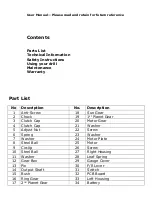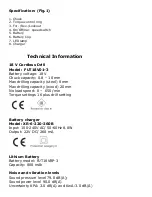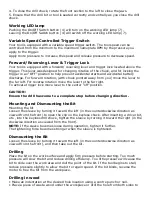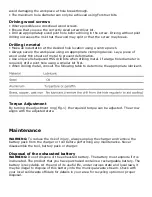
11) Keep unused batteries away from paper clips, coins, keys, nails, screws and other
metallic objects that could cause a short circuit between the contacts. A short circuit
between the battery contacts may cause burns or a fire.
12) In case of incorrect use, fluid may escape from the battery. Avoid contact with it. If
you touch it by accident, rinse the affected area with water. If you get the fluid in your
eyes, also seek medical advice. Leaking battery fluid can cause skin irritation or burns.
Safety Warnings for Battery Pack
a) Do not dismantle, open or shred cells or battery pack.
b) Do not short-circuit a battery pack. Do not store battery packs haphazardly in a box
or drawer where they may short-circuit each other or be short-circuited by conductive
materials. When battery pack is not in use, keep it away from other metal objects, like
paper clips, coins, keys, nails, screws or other small metal objects that can make a
connection from one terminal to another. Shorting the battery terminals together may
cause burns or a fire.
c) Do not expose battery pack to heat or fire. Avoid storage in direct sunlight.
d) Do not subject battery pack to mechanical shock.
e) In the event of battery leaking, do not allow the liquid to come into contact with the
skin or eyes. If contact has been made, wash the affected area with copious amounts of
water and seek medical advice.
f) Seek medical advice immediately if a cell or battery pack has been swallowed.
g) Keep battery pack clean and dry.
h) Wipe the battery pack terminals with a clean dry cloth if they become dirty.
i) Battery pack needs to be charged before use. Always refer to this instruction and use
the correct charging procedure.
j) Do not maintain battery pack on charge when not in use.
k) After extended periods of storage, it may be necessary to charge and discharge the
battery pack several times to obtain maximum performance.
l) Battery pack gives its best performance when it is operated at normal room
temperature (20 °C ± 5 °C).
m) When disposing of battery packs, keep battery packs of different electrochemical
systems separate from each other.
n) Recharge only with the charger specified. Do not use any charger other than that
specifically provided for use with the equipment. A charger that is suitable for one type
of battery pack may create a risk of fire when used with another battery pack.
o) Do not use any battery pack which is not designed for use with the equipment.
p) Keep battery pack out of the reach of children.
q) Retain the original product literature for future reference.
r) Remove the battery from the equipment when not in use.
s) Dispose of properly.
Additional Safety Instructions for Your Battery Charger
1. Do not charge a leaking battery.
2. Do not use chargers for works other than those for which they are designed.
3. Before charging, ensure your charger is matching the local AC supply.
4. For indoor use, or do not expose to rain.
5. The charging device must be protected from moisture.
6. Do not short out the contacts of battery or charger.
7. Respect the polarity “+/-“ when charging.


































